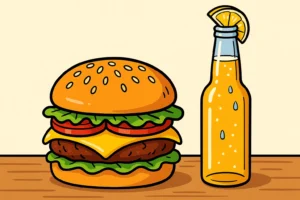Financial options contracts are really just options. That is, they give us a choice or an option to do something. We’ll go through a simple example of why options are valuable.
Let’s say I offer you the option to use my truck.

What might the value of this option be to you?
Is it Intrinsically Valuable?
Maybe you need to pick up a bath from the hardware store today.
In this case, the option to use my truck would be intrinsically valuable to you right now.
The option is worth more to you the more intrinsically valuable it is (the more you need the truck).
How Uncertain is Your Need For a Truck?
Maybe you know you’re going to need a truck every Easter to take your Aunt’s chickens to their annual spa day.
In this case, the option to use my truck at any point in the life of the option just isn’t that valuable to you. You have a lot of certainty around what’s going to happen and when you are going to need a truck. You’d just go and hire a truck at Easter. You don’t need the optionality.
On the other hand, if you suspect that you might need to use a truck over the next few months, but are not sure exactly when and under what conditions, then the option is valuable.
The option is worth more to you, if it is not currently intrinsically valuable, the more uncertain the range of potential outcomes.
How Long Does The Option Last?
It’s clear that the option to use my truck would be more valuable if you had the option for longer.
Maybe you need to pick up that bath now, or maybe you need it later in the week? Maybe you have an uncertain need for a truck over the next year?
The option is worth more to you the longer it lasts.
Summary
If you have the option to do something, the value of the option depends on a few main factors:
- Is the thing you have an option on intrinsically valuable? (if the thing you have an option over is more valuable, then the option is more valuable)
- How uncertain (random) is the outcome? (more uncertain => more valuable, if not intrinsically valuable right now)
- How long do you have the option for? (option lasts longer => higher price)
Financial Options
Financial options are options just like this. They give you the option to trade an asset at a certain price by a certain date.
If you are offered a call option, this gives you the option to buy an asset at a certain price by a certain date.
Just like the truck option, the value of this option depends on:
- Is the trade intrinsically valuable? Can I buy it cheaper in the market or at the option price (the “strike”)
- How uncertain is the outcome? If the price of the asset is moving around a lot then there’s more of a chance that the option becomes intrinsically valuable than if it is barely moving.
- How long does the option last? The longer the option, the more time it has to become intrinsically valuable.
Options are simply choices. Most of the core ideas around the fair value and risk associated with options can be understood in the same way as any other choice you can make in life.
In the next article, we’ll go over some definitions and examples.



8 thoughts on “Options are just options – Why are they valuable?”